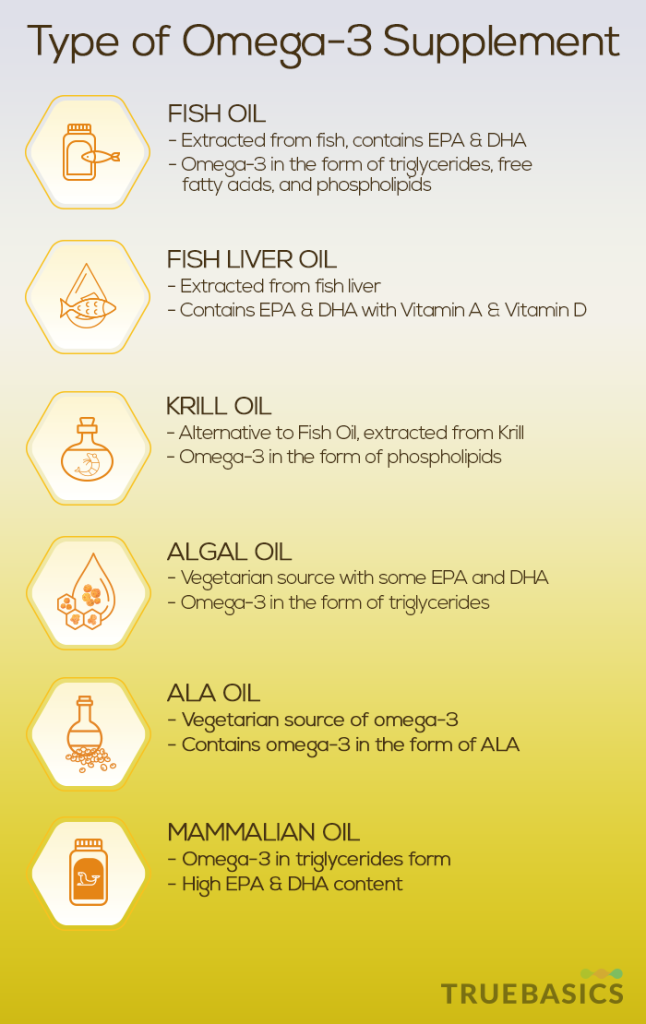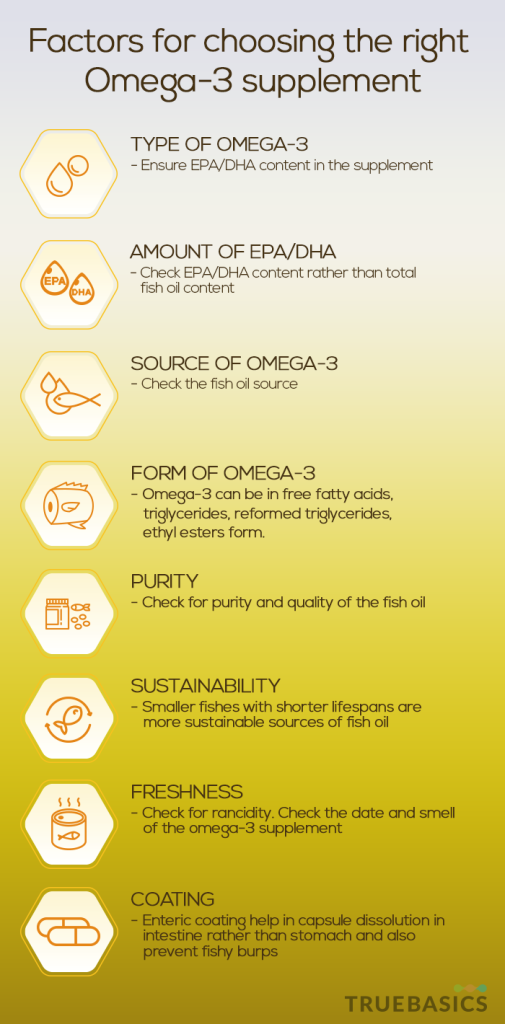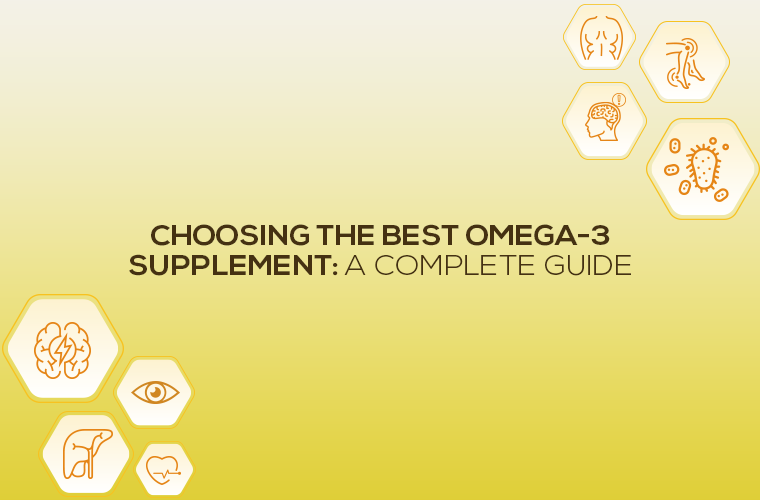Omega-3 dietary supplements have become ubiquitous for maintaining health and fitness. But what are they? Do you need them? How to select the right omega-3 for you? Dive right in to find out.
Omega-3 Fatty Acids
Omega-3 fatty acids are polyunsaturated fatty acids. There are three main types of omega-3 fatty acids – Alpha-Linolenic acid (ALA), Eicosapentaenoic acid (EPA), and Docosahexaenoic acid (DHA). ALA is mostly used as an energy source while EPA & DHA are more functionally form of Omega-3 and the key reasons behind omega-3 multiple benefits. Omega-3 is known to help promote heart health, improve eye & brain health, improve bone & joint health, help maintain skin health, help in combating anxiety and depression and several other benefits.
Need for Omega-3 Supplements
Our body cannot produce omega-3 on its own and therefore it needs to be consumed through external dietary sources. While there are no RDA values set by organizations around the world, experts recommend a daily dose of at least 1000 mg of Omega-3. Fatty fishes are a good source of omega-3. You’ll need to consume higher amounts of good quality fish on a regular basis to meet the daily requirement of omega-3. However, it is not an option for most Indians due to lifestyle preferences (Vegans/ Vegetarians/ Non-Fish eaters), the absence of good quality fishes and financial constraints. Vegetarians can consume plant sources such as Walnuts, Flaxseeds, Chia seeds to meet the omega-3 requirement. However, they’ll be getting only ALA from these sources and their EPA/DHA levels would still be lower than required. Therefore, dietary supplements play an important role in bridging the gap between daily omega-3 requirements and actual intake. If you are unable to fulfill your omega-3 requirements from dietary sources, you can consider taking omega-3 supplements. Choose the right omega-3 suited to your preference and requirement to reap the benefits of omega-3 fatty acids.
Forms of omega-3 fatty acids in dietary supplements
While choosing the right TrueBasics Omega 3, it is important to understand the form of omega-3 available in the dietary supplement. Your omega-3 supplement would generally have omega-3 in the following form –
- Natural triglycerides – Occur naturally
- Ethyl esters – Processed from natural triglycerides
- Reformed or re-esterified triglycerides – Synthesized by conversion of ethyl esters back to triglycerides
- Free fatty acids – Occur naturally
- Phospholipids – Occur naturally
All forms of omega-3 fatty acids significantly increase plasma DHA and EPA levels. Some studies have reported that natural triglycerides, free fatty acids, and reformed triglycerides seem to have comparatively higher bioavailability and are absorbed better than ethyl esters. However, other studies suggest that triglycerides and ethyl esters are absorbed equally.
Type of Omega-3 Supplement
1. Fish Oil
As the name suggests, the source of omega-3 in fish oil is fish. Omega-3 is present in the form of free fatty acids, triglycerides, and phospholipids in fish. Fish oil is available in natural as well as processed forms. Natural fish oil is commonly obtained from sources such as sardines, salmon, herring and cod liver. The DHA and EPA content in natural fish oil varies between 18% to 31% as per different species of fish. It is important to note that the processing of fish oil affects the form of fatty acids and absorption of some forms can be better than the others.
Conventional fish oils primarily contain omega-3 in the form of triglycerides. Processed fish oil goes through purification and/or concentration process and contains about 50% to 90% of EPA and DHA content. In processed fish oils, triglycerides are converted into ethyl esters to adjust EPA & DHA concentration in the oil. These ethyl esters can again be converted into triglycerides which are called reformed triglycerides or re-esterified triglycerides.
2. Krill Oil
Krill oil is an alternative to fish oil and is extracted from Krill. It primarily contains omega-3 in the form of phospholipids. Krill oil is considered to be resistant to oxidation as it contains astaxanthin which is a potent antioxidant. It is rarely obtained in ethyl ester form and generally doesn’t require much purification as its lifespan is short and therefore less contamination. Some studies suggest higher bioavailability in comparison to fish oil, but the scientific evidence is very limited. It should be noted that Krill is an endangered species in the marine food chain as compared to fish which is available in abundance.
3. ALA Oil
All plant sources of omega-3 fatty acids primarily contain omega-3 in the form of ALA. ALA is particularly found in large amounts in flax seeds, walnuts, hemp seeds, and chia seeds. Although ALA is converted to EPA & DHA in the body, the conversion process is very inefficient and only up to ~20% ALA is converted to EPA while only up to ~9% ALA is converted to DHA. ALA oil is available in the form of flaxseed, soybean or canola oil. Most plant sources are also high on omega-3 content.
4. Algal Oil
Algal primarily contains omega-3 fatty acids in the form of triglycerides. Marine algae are the source behind Algal oil. It is a good omega-3 alternative for vegans and vegetarians because it is a plant-based source that also contains some amount of EPA and DHA. According to observations of a scientific study, Algal Oil DHA has equal bioavailability as that of cooked salmon. It also doesn’t contain contaminants.
5. Mammalian Oil
Mammalian oil is extracted from seals and contains omega-3 fatty acids in the form of natural triglycerides. Along with EPA and DHA, it shows a high presence of docosapentaenoic acid (DPA) – another omega-3 fatty acid with multiple potential health benefits.
6. Green Lipped Mussel Oil
It primarily contains omega-3 fatty acids in the form of free fatty acids and triglycerides. It shows the trace presence of eicosatetraenoic acid (ETA) which is a rare omega-3 fatty acid, along with EPA and DHA. ETA shows greater potency to counter inflammation as compared to other omega-3 fatty acids.

Factors for Choosing Omega-3 Supplements
Choosing the right supplement depends on multiple factors. Dive right in to know the key factors to keep in mind while choosing the right omega-3 supplement for you.
1. Type of Omega-3
Ensure that your supplement contains EPA and DHA. These are the functionally active form of omega-3 and carries multiple potential health benefits in heart, joints, eye, brain and skin health.
2. Amount of Omega-3
Remember that it is not the amount of total fish oil but the amount of EPA and DHA in the supplement that matters. Some supplements might be high on total omega-3 but low on total EPA and DHA. Supplements mentioning 1000 mg of fish oil per capsule may contain only 320 mg of EPA or DHA. Therefore, check the exact composition of omega-3 on the label of your supplement.
3. Source of Omega-3
Check the source of omega-3 and choose as per dietary preference (plant vs marine source) and benefits (fish oil vs krill oil etc.)
4. Form of Omega-3
Omega-3 in your supplement can be in the form of free fatty acids, triglycerides, reformed triglycerides, ethyl esters, and phospholipids. Studies have suggested different absorption levels based on the form of omega-3.
5. Purity
Check for product quality and prefer products with high purity levels and low contaminants. Marine sources are prone to heavy metal contamination from sea water which can pass on to the fish oil as well.
5. Sustainability
Smaller fish with shorter lifespan is more sustainable ecologically than others.
6. Freshness
Omega-3 fish oil is prone to oxidation and can go rancid if left open for longer periods. Rancid fish oil would lose its freshness and turn less potent or harmful with a foul smell. Therefore, check the date and smell of the product. It is noted that products containing ethyl esters form have more tendency of undergoing oxidation and turning rancid as compared to those containing triglycerides form of omega-3 fatty acids. Also, check whether your omega-3 supplement contains antioxidants such as vitamin E which can help to fight rancidity.
7. Coating
Fishy burps are a common phenomenon that has been associated with omega-3 fish oil capsules. In cases where omega-3 capsule starts dissolving in the stomach itself rather than intestine, a reflux action can bring the aftertaste back to mouth leading to fish burps and foul aftertaste. Prefer products with enteric coating rather than a cheap coating to avoid the fishy aftertaste. Enteric coating helps in dissolution at the right site (intestine rather than stomach) and prevent “fishy” burps after the capsule intake.

Choosing the Right Omega-3 Supplement
So, finally how to choose the right omega-3 supplement? Check the pointers below for our recommendations
- Ensure your omega-3 supplement has some EPA and DHA in it
- Check for EPA and DHA content. Ideally, opt for a supplement with at least 1000 mg Omega-3. Actual EPA and DHA content depend on your requirements. Consult with a doctor if a higher dose of omega-3 is required
- Try to include omega-3 supplements which are in triglycerides, free fatty acids or phospholipids for better absorption. However, some studies maintain that ethyl ester supplements are also equally absorbable.
- For best results, opt for high purity supplements which are free from heavy metal contamination
- Check the date and smell of the product. Avoid products that are prone to being rancid.
- You can choose omega-3 supplements with an enteric coating which ensures the dissolution of the capsule at the right place and help avoid fishy aftertaste.
In Conclusion…
Omega-3 fatty acids offer multiple health benefits. The daily requirement of omega-3 can be fulfilled by including fatty fishes in the diet. However vegetarian lifestyle and lack of good quality fishes present a challenge in fulfilling the daily omega-3 requirement. If you are not able to fulfill your daily requirement from dietary sources, then the omega-3 supplement can help you fulfill the requirements.
Choose the amount of omega-3 needed as per your requirement (at least 1000 mg for healthy adults and higher requirements for specific cases). Ensure the actual amount of EPA and DHA from the product label. Check for purity, freshness, and fish oil source. You should opt for enteric coated capsules to avoid the fishy aftertaste.
Choose rightly and wisely for a healthy life
Sources:
[1] https://ods.od.nih.gov/factsheets/Omega3FattyAcids-HealthProfessional/
[2] https://pubmed.ncbi.nlm.nih.gov/1826985-absorption-of-the-n-3-eicosapentaenoic-and-docosahexaenoic-acids-as-ethyl-esters-and-triglycerides-by-humans/
[3] https://pubmed.ncbi.nlm.nih.gov/21063431-enhanced-increase-of-omega-3-index-in-response-to-long-term-n-3-fatty-acid-supplementation-from-triacylglycerides-versus-ethyl-esters/
[4] https://pubmed.ncbi.nlm.nih.gov/1826985-absorption-of-the-n-3-eicosapentaenoic-and-docosahexaenoic-acids-as-ethyl-esters-and-triglycerides-by-humans/
[5] https://link.springer.com/article/10.1007/s11746-015-2612-9
[6] https://www.healthline.com/nutrition/omega-3-supplement-guide#best-omega–3-supplements
[7] https://www.vitacost.com/blog/vitamins-supplements/supplements/how-to-choose-omega-3-fish-oil-supplements.html
[8] https://wellness.ucsd.edu/studenthealth/Documents/nutrition/omega3supp.pdf
[9] https://pubmed.ncbi.nlm.nih.gov/24679797-effect-of-temperature-towards-lipid-oxidation-and-non-enzymatic-browning-reactions-in-krill-oil-upon-storage/
[10] https://pubmed.ncbi.nlm.nih.gov/17638133-anti-inflammatory-activity-of-a-lipid-fraction-lyprinol-from-the-nz-green-lipped-mussel/
[11] https://pubmed.ncbi.nlm.nih.gov/20655949-docosapentaenoic-acid-225n-3-a-review-of-its-biological-effects/
[12] https://pubmed.ncbi.nlm.nih.gov/18589030-algal-oil-capsules-and-cooked-salmon-nutritionally-equivalent-sources-of-docosahexaenoic-acid/
[13] https://pubmed.ncbi.nlm.nih.gov/12936959-achieving-optimal-essential-fatty-acid-status-in-vegetarians-current-knowledge-and-practical-implications/
[14] https://pubmed.ncbi.nlm.nih.gov/2847723-absorption-of-eicosapentaenoic-acid-and-docosahexaenoic-acid-from-fish-oil-triacylglycerols-or-fish-oil-ethyl-esters-co-ingested-with-a-high-fat-meal/













